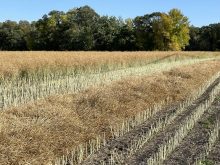Farmers and grain companies could suffer sticker shock when they see the new fees the Canadian Grain Commission (CGC) is proposing.
For example, the CGC is proposing a fivefold increase for inward grain inspection. If endorsed, the CGC will charge $107.50 a car to grade wheat as it enters a terminal elevator instead of the current $20.10.
And the CGC projects the new fees, which it wants to implement effective April 1, 2012, will increase by 1.6 per cent a year until 2016-17.
(See the proposed new fees at http://www.grainscanada.gc.ca/consultations/2011/fees-frais/ifcd-dcfi/ifcd-dcfi-00-eng.htm).
Read Also

Tie vote derails canola tariff compensation resolution at MCGA
Manitoba Canola Growers Association members were split on whether to push Ottawa for compensation for losses due to Chinese tariffs.
The CGC isn’t proposing all its fees jump by that much. For example the charge to administer a producer car would go up $5 to $25.
The CGC also proposes to cut its fee for the registration and cancellation of receipts at licensed terminal elevators to one cent a tonne from the current eight cents.
But to achieve 100 per cent cost recovery, the CGC says its fees and services, on average, must more than double.
Currently about half of the CGC’s $80-million budget comes from fees for its services, most of which ultimately are paid for by farmers. The rest comes from the federal government.
BUDGET SHIFT
In a discussion paper released in December, the CGC said it expects its annual budget will soon increase to $90 million and it wants to get all of it – another $50 million a year – from user fees.
Farmers, grain companies and others interested in CGC operations have until March 31 to comment on proposed fee hike, said Rémi Gosselin, the CGC’s manager of corporate information services.
After getting feedback, the CGC will release a summary of the comments it received during the first phase of consultations, comments about the proposed changes to individual fees and a summary of the results of a survey of farmers the CGC commissioned last November, Gosselin said.
The CGC will review and consider all the feedback when it develops a formal proposal on fees to be presented to the government.
The first phase of CGC consultations included public hearings in December and January. The CGC received 26 written submissions and 80 oral presentations.
While several farm groups agree producers should pay a bit more specifically for services that benefit them directly, they stress much of what the CGC does is for the public good and should be paid for by taxpayers.
“I know the feds would like to see full cost recovery, but we don’t think that’s necessarily fair to us as producers,” Keystone Agricultural Producers (KAP) vice-president Rob Brunel said in an earlier interview.
“The CGC is one of the basics for food safety within this country when it relates to grains and oilseeds.”
OPPOSED
The Canadian Wheat Board (CWB) says the CGC should not seek full cost recovery.
The Western Grain Elevators Association contends under the User Fees Act government agencies can only charge for services if they benefit the person paying for them. This implies the CGC can’t charge for mandatory services.
The WGEA and Western Canadian Wheat Growers Association say before changes are made, the CGC’s services need to be reviewed, and in some cases, changed. That would require amendments to the Canada Grain Act.
Farm groups also want the CGC to be as efficient as possible. Certain mandatory CGC services could be made optional or done more cheaply by third parties, the CWB, WCWGA and WGEA say.
Citizens who have a complaint about how the CGC has conducted its consultations so far or how it has come up with its proposed fees, have until March 31 to submit them in writing, Gosselin said. If the CGC can’t resolve the complaint by April 30, it could be put before an independent advisory panel, which can recommend a solution, he said.
NEXT STEPS
The CGC said in a release that the next steps in the process include the federal minister tabling the user fees proposal in the House of Commons and the Senate. This is a requirement under the User Fees Act.
The CGC will seek approval of a new fee schedule from the governor-in-council. This is a requirement of the Canada Grain Act and the government’s regulatory process.
The public will be asked to comment on the new fee schedule when it appears in the Canada Gazette,Part I.
The final step is implementation, which the CGC hopes to do April 1 next year. [email protected]
———
“Iknowthefedswouldliketoseefullcostrecovery,butwedon’tthinkthat’snecessarilyfairtousasproducers.”
– ROB BRUNEL














